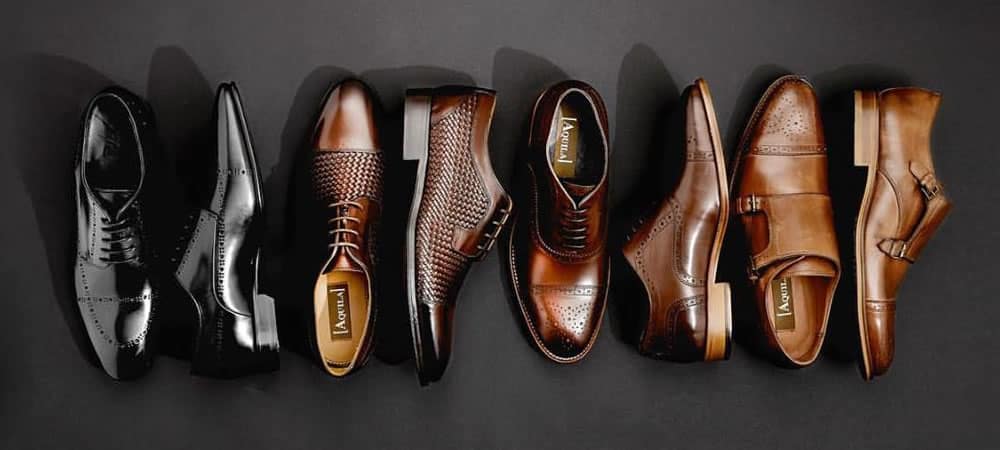6 of the best waterproof men’s jackets for spring showers from Finisterre
Feb 20, 2026Don’t use your pockets – Permanent Style
- Nov 8, 2024
- 0 Comments
270
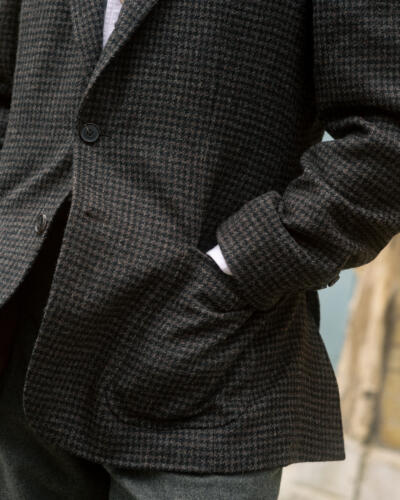
The ‘Rules’ section on PS is a repository for all those conventions that have built up over the years around classic menswear and which people quote too much, often without thinking what they mean, why they exist, or why in fact they should be followed.
We’ve addressed a fair number them over the years, including wearing white after Labor Day and wearing brown in town, buttoning your jacket and specifically which button to button (always the hardest one). The intention each time is to answer those questions: why did these rules or conventions come into existence, how relevant are they today, and therefore should you care?
Today it is the turn of pockets, specifically putting your hands in your pockets. Most of us will remember someone telling us this was uncouth, but surely even with tailoring, those days have gone? Well, yes and no.
First, why would this convention come to exist in the first place?
Well, tailoring is a beautiful, fine piece of structure. It is precisely cut to render clean, uninterrupted lines that are both elegant and flattering. Spoiling that by shoving your hands in the trouser pockets, pushing up and rumpling the jacket everywhere, is a bit of a shame.
This happens when you move your arms around as well of course. Also when you sit – the jacket isn’t necessarily going to look its best then. But those things are unavoidable. Using trouser pockets is not.
Really? I mean wouldn’t it be weird to just stand there all the time with your hands rigid at your side?
No, not necessarily. After all, the military have been told not to use their pockets for a long time. Just this year, the US Navy finally relaxed its rules on pocket use, saying they could “have hands in their pockets, when doing so does not compromise safety nor prohibit the proper rendering of honours and courtesies”. (Those who have served, do as ever please pitch in.)
I think the two reasons given by the Navy there are significant: having your hands in your pockets seems impractical, as a sailor would be less ready to perform its duties; and it would be discourteous, a question of propriety and respect.
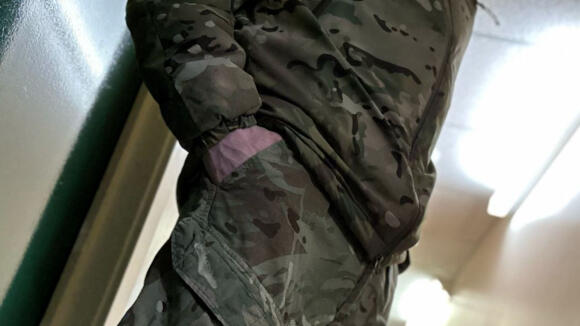
The latter is the main factor when it comes to tailoring. A businessman who always stood slouched, their fists deep in their pockets, would look a little unprofessional. It’s part of the impression you give to those around you – just as much as whether your tie is askew or your shirt untucked.
So the first things to bear in mind when considering whether the hell to care about this convention is, who are you and where are you? Having a beer in the pub or making a client presentation? It may not really matter much in this day and age, when dress codes have gone out the window, but those are the key points.
Now the flip side of this is that you might use your pockets to deliberately subvert the formal impression of a suit. Perhaps you want to casualise it – so wear it with casual shirts, with casual boots, with the jacket open most of the time. Using the trouser pockets is part of the same attitude.

Jacket pockets as well. This became a bit of a fad when #menswear first became popular 15-odd years ago. Every stylish Italian seemed to have their hands plunged into their jacket pockets, and it looked so damn cool. The guys at The Armoury in Hong Kong started doing it, so did everybody else, and before you knew it, it was a thing.
You still see echoes of that today. I still have a faint echo of it ringing in my head when I do it. And it can look cool, it can be a significant part of the way we’re re-contextualising tailoring today. But it can also be pushed too far – usually when it looks forced, like so many things in menswear.
Things that make it look unnatural include doing it with jackets that are too short, or way too tight, so the vents are splaying all over the place. A slouchy jacket helps, as does doing it all the time, so it feels instinctive.
Something that rarely looks natural, to me, is having one hand in the jacket pocket and a thumb hooked over the top (below). It might spoil the ones of the jacket less, but it always looks awkward and fussy.
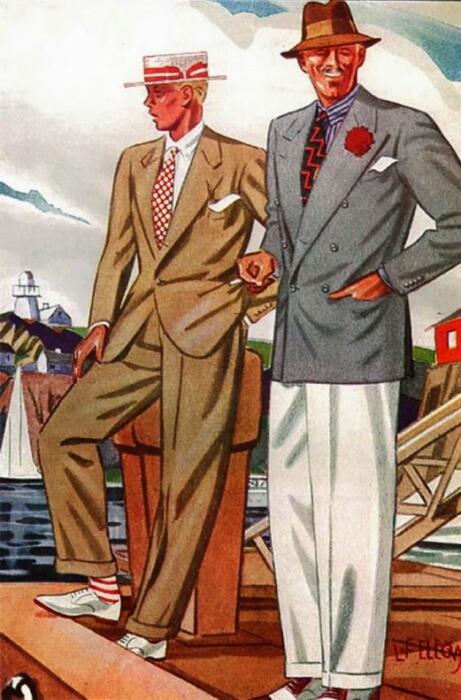
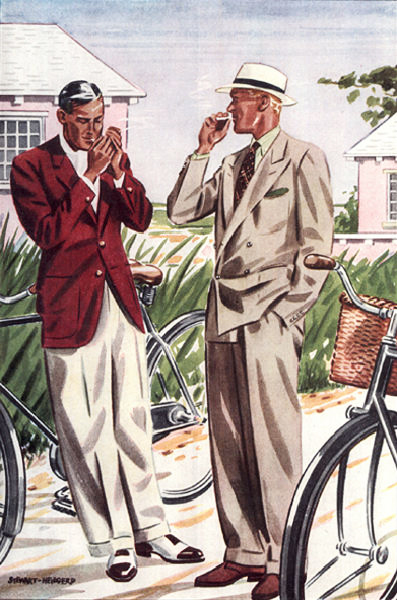
If you did want to give a smarter impression – with your jacket buttoned up and your tie sprung to attention – it is still possible to use your trouser pockets, just keep it to one.
That way one half of the jacket is still perfectly sharp and elegant, but you don’t feel you’re standing to attention either. If you look at a lot of old imagery of tailoring in the 30s and 40s, this is very common (above). Although it’s also not hard to find images of men – at least in more casual settings – with both hands in their pockets too.
Interestingly, this is despite jackets often being ventless. And to me, using your trouser pockets with a ventless jacket looks plain awful. Back of the jacket all over the place.
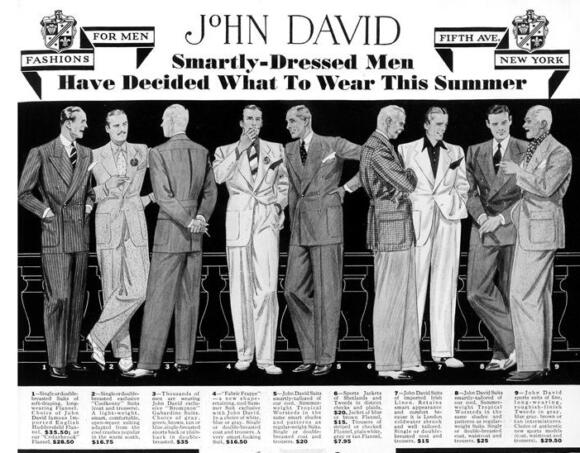
The occasion when this is most relevant today is with black tie, because it’s the time most men are likely to wear a ventless jacket, if they wear one at all. In that case, however, it’s a formal occasion and you should be paying more attention to propriety anyway.
The biggest disadvantage of a single vent, for me, has also always been the way it opens when you put your hands in your trouser pockets. Your bum is revealed like the curtains opening on a stage; not the effect most of us want.
So if was wearing a single-vent jacket – perhaps a tweed hacking one – I’d probably push the jacket back with my hand before using the trouser pocket, rather than raising it at the side (eg below).

Conventions build up because they give certain effects, produce a certain impression. Using your trouser pockets is no exception, and jacket pockets even more so.
But the final question always is – do you care? Who are you, where are you, and what impression do you want to give? You’re going to give one – there’s no choice there – but you can very much decide what it is.
So please, let’s avoid the the knee-jerk reaction of “it’s just damned awful”, “not in my day” and so on. Nothing is as simple or as boring as that.

Publisher: Source link






